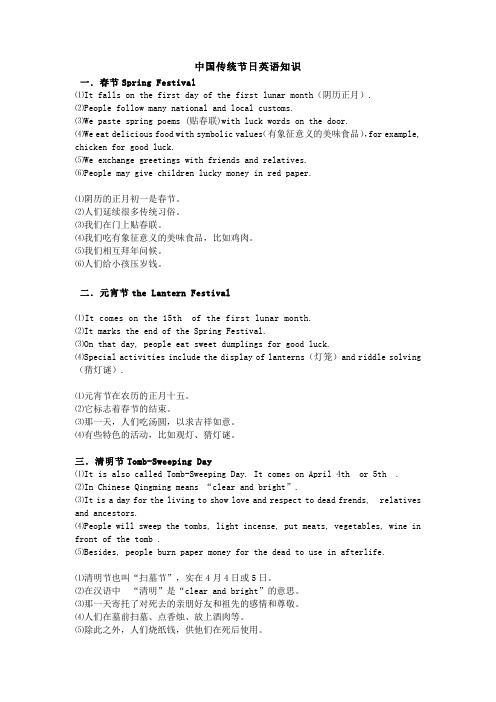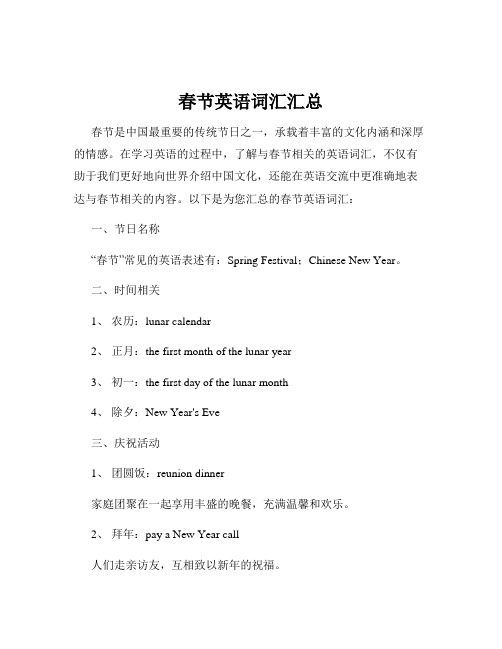春节英语小知识
春节常用英文小知识2

春节常用英文小知识2Don't buy new shoes for the first month of the New Year, because the sound of shoe in Chinese is不要在新年的第一个月买新鞋,因为在汉语里鞋的发音是Don't wash your hair for the first three days of the New Year, because the Chinese word for hair is a homonym for the Chinese word for wealth. Therefore, Chinese believe it isn't a good thing to 'wash away your wealth' right at the start of the New Year.在新年的前三天里不要洗头,因为汉语里Floors may not be swept and garbage may not be disposed of on the first day of the New Year for fear of casting riches out the door.在新年第一天,不拖地,不扔垃圾,因为怕把Don't swear or quarrel.不要诅咒发誓,也不愿吵架。
Don't break any dishes, otherwise you may incur more misfortune for the New Year. In the event of breaking a dish, quickly say不要打破碗碟,否则在来年你可能会遭遇不幸.一旦打破了,要马上说Don't greet people who are in mourning.不要向服丧期的人们问候(主要指不要说喜庆的话吧?)Don't drop your chopsticks.不要让筷子掉地上。
中国传统节日英语知识

中国传统节日英语知识一.春节Spring Festival⑴It falls on the first day of the first lunar month(阴历正月).⑵People follow many national and local customs.⑶We paste spring poems (贴春联)with luck words on the door.⑷We eat delicious food with symbolic values(有象征意义的美味食品),for example, chicken for good luck.⑸We exchange greetings with friends and relatives.⑹People may give children lucky money in red paper.⑴阴历的正月初一是春节。
⑵人们延续很多传统习俗。
⑶我们在门上贴春联。
⑷我们吃有象征意义的美味食品,比如鸡肉。
⑸我们相互拜年问候。
⑹人们给小孩压岁钱。
二.元宵节the Lantern Festival⑴It comes on the 15th of the first lunar month.⑵It marks the end of the Spring Festival.⑶On that day, people eat sweet dumplings for good luck.⑷Special activities include the display of lanterns(灯笼)and riddle solving (猜灯谜).⑴元宵节在农历的正月十五。
⑵它标志着春节的结束。
⑶那一天,人们吃汤圆,以求吉祥如意。
⑷有些特色的活动,比如观灯、猜灯谜。
三.清明节Tomb-Sweeping Day⑴It is also called Tomb-Sweeping Day. It comes on April 4th or 5th .⑵In Chinese Qingming means “clear and bright”.⑶It is a day for the living to show love and respect to dead frends, relatives and ancestors.⑷People will sweep the tombs, light incense, put meats, vegetables, wine in front of the tomb .⑸Besides, people burn paper money for the dead to use in afterlife.⑴清明节也叫“扫墓节”,实在4月4日或5日。
春节英语词汇汇总

春节英语词汇汇总春节是中国最重要的传统节日之一,承载着丰富的文化内涵和深厚的情感。
在与国际友人交流或学习英语的过程中,了解春节相关的英语词汇是很有必要的。
下面就为大家汇总一些常见的春节英语词汇。
一、节日名称“春节”常见的英语表述有:Spring Festival;Chinese New Year 。
二、庆祝时间春节通常在农历正月初一,但庆祝活动往往从前一年的腊月二十三(小年)就开始了。
“农历”用“lunar calendar”表示;“正月”可以说“the first month of the lunar year”;“初一”则是“the first day of the lunar month”;“小年”是“Minor Spring Festival”或者“Preliminary Eve”。
三、传统习俗1、扫尘(Cleaning the House)春节前,家家户户都会进行大扫除,寓意扫除过去一年的晦气和不幸,迎接新的一年的好运。
2、贴春联(Pasting Spring Couplets)“春联”即“Spring Couplets”,人们会在门口贴上红色的春联,增添喜庆的氛围。
3、贴窗花(Pasting PaperCuts for Windows)精美的窗花也是春节的一大特色,“窗花”用“PaperCuts for Windows”来表达。
4、守岁(Staying Up Late on New Year's Eve)在除夕夜,一家人会团聚在一起,熬夜守岁,等待新年的到来。
“除夕夜”是“New Year's Eve”。
5、吃年夜饭(Having New Year's Eve Dinner)年夜饭是一年中最重要的一餐,家人围坐在一起,共享美食。
6、拜年(Paying New Year Calls)大年初一开始,人们会走亲访友,互相拜年,送上新年的祝福。
7、给压岁钱(Giving Red Envelopes)长辈会给晚辈压岁钱,“压岁钱”就是“Red Envelopes”或“Lucky Money”,希望孩子们在新的一年里健康快乐。
文化课堂 春节的英文知识

春节,也被称为中国新年,是中华民族最重要的传统节日之一。
这一节日的英文是:“Chinese New Year” 或“Lunar New Year”。
下面是一些与春节相关的英文知识和表达:1.春节的起源:春节起源于上古时代的岁首祈岁祭祀,由此演变而来。
The origin of the Spring Festival can be traced back to the ancient era, when it was a time for sacrifice and prayers at the beginning of the year.2.春节的习俗:春节有许多传统习俗,如贴春联(posting Spring Festival couplets)、放鞭炮(setting off fireworks)、拜年(paying New Year's visits)、吃团圆饭(having a reunion dinner)等。
3.春节的食物:春节期间,人们通常会吃年糕(New Year's cake)、饺子(jiaozi)、汤圆(tangyuan)等具有象征意义的食物。
4.春节的意义:春节不仅仅是一个节日,它更是中华民族的文化象征,代表着团圆、和谐、吉祥和富裕。
The Spring Festival is not just a holiday, but also a cultural symbol of the Chinese nation, representing unity, harmony, good luck, and prosperity.5.春节的英文祝福:在春节期间,人们可以用英文向朋友和家人发送祝福,如:“Wishing you a happy and prosperous Chinese New Year!” 或“Happy Lunar New Year! May all your wishes come true!”6.春节的英文名称:虽然春节在英文中通常被称为“Chinese New Year”,但在一些国家和地区,如新加坡和马来西亚,它也被称为“Lunar New Year”,因为这一节日是基于农历而非公历来庆祝的。
春节英语词汇汇总

春节英语词汇汇总春节是中国最重要的传统节日之一,承载着丰富的文化内涵和深厚的情感。
在学习英语的过程中,了解与春节相关的英语词汇,不仅有助于我们更好地向世界介绍中国文化,还能在英语交流中更准确地表达与春节相关的内容。
以下是为您汇总的春节英语词汇:一、节日名称“春节”常见的英语表述有:Spring Festival;Chinese New Year。
二、时间相关1、农历:lunar calendar2、正月:the first month of the lunar year3、初一:the first day of the lunar month4、除夕:New Year's Eve三、庆祝活动1、团圆饭:reunion dinner家庭团聚在一起享用丰盛的晚餐,充满温馨和欢乐。
2、拜年:pay a New Year call人们走亲访友,互相致以新年的祝福。
3、红包:red envelope / red packet里面通常装有压岁钱,寓意祝福和好运。
4、放鞭炮:set off firecrackers噼里啪啦的鞭炮声增添了节日的热闹氛围。
5、烟花:fireworks绚丽多彩的烟花在夜空中绽放,美不胜收。
6、舞龙舞狮:dragon and lion dance精彩的表演展示了中国传统文化的魅力。
四、传统习俗1、贴春联:put up Spring Festival couplets春联通常用红纸书写,富有诗意和吉祥的话语。
2、挂灯笼:hang lanterns红彤彤的灯笼营造出喜庆的氛围。
3、守岁:stay up late on New Year's Eve一家人熬夜迎接新年的到来。
4、祭祖:offer sacrifices to ancestors表达对祖先的敬意和怀念。
五、美食相关1、饺子:dumplings形状像元宝,象征着财富和好运。
2、年糕:rice cake寓意着“年年高”,希望生活越来越好。
春节的英语资料

春节的英语资料有关春节的英语资料有关春节的英语资料1Spring Festival is refers to the cultural circle of Chinese characters on the traditional lunar new year, commonly known as the "Festival", the traditional names for the new year, new year, new year, but verbal also known as of old, celebrate the new year, Chinese new year, is the Chinese nation most grand traditional Festival.During the Spring Festival, China's Han nationality and some ethnic minorities have to hold various celebration activities. These activities are to ancestor worship God, pay homage to their ancestors, Chujiubuxin, Ying Fuk Jubilee then, pray for good harvest as the main content, rich and colorful form, with rich ethnic characteristics. Influenced by Chinese culture, some of the Chinese character culture circle of some countries and nationalities also have the custom of celebrating the spring festival. People in the Spring Festival this day as far as possible to return home and family reunion, expressing the hope for the next year and the new year of life's good wishes.The Spring Festival is not only a festival, but also the Chinese people's emotional release, psychological demands to meet the important carrier, is the Chinese nation's annual carnival and eternal spiritual pillar.春节是指汉字文化圈传统上的农历新年,俗称“年节”,传统名称为新年、大年、新岁,但口头上又称度岁、庆新岁、过年,是中华民族最隆重的传统佳节。
春节英文知识点总结

春节英文知识点总结Red decorations: Red is the dominant color during the Spring Festival, symbolizing good luck and joy. People hang red lanterns, couplets, and paper cutouts on doors and windows to ward off evil spirits and attract good fortune. Red envelopes containing money, known as hongbao (红包), are also given to children and unmarried adults as a token of good wishes.Fireworks and firecrackers: The sound of fireworks and firecrackers is a common feature of Chinese New Year celebrations. Traditionally, the loud noises are believed to scare away evil spirits and bring good luck for the new year. However, in recent years, many cities in China have imposed restrictions on fireworks due to safety and environmental concerns.Family reunion dinner: On the eve of the lunar new year, families gather for a lavish reunion dinner known as nianyefan (年夜饭). It is a time to enjoy special dishes such as fish, dumplings, and sticky rice cake, and to bond with loved ones. The reunion dinner is a significant part of the Spring Festival as it symbolizes togetherness and harmony.Lion and dragon dances: Colorful lion and dragon dances are performed in many Chinese communities during the Spring Festival. The dances are believed to bring good luck and prosperity for the coming year. They are accompanied by loud drumming and cymbals, creating a festive and lively atmosphere.Visiting relatives and friends: During the 15-day celebration of the Chinese New Year, people visit their relatives and friends to extend their good wishes. It is customary to bring gifts and treats, and to exchange well-wishes for health, happiness, and success in the new year.Lantern festival: The 15th day of the lunar new year marks the end of the Spring Festival and is celebrated with the Lantern Festival. This is a time for people to go out and admire colorful lanterns, solve riddles written on them, and enjoy traditional performances such as the lion dance. The Lantern Festival is a joyful and auspicious occasion that symbolizes the end of winter and the beginning of spring.The zodiac animals: Each year in the Chinese lunar calendar is associated with one of the 12 zodiac animals, which are rat, ox, tiger, rabbit, dragon, snake, horse, goat, monkey, rooster, dog, and pig. The animal for a particular year is believed to have a profound influence on a person's personality and fate. People often wear clothing and accessories featuring the zodiac animal of the year to attract good luck and ward off misfortune.Eating lucky foods: Certain foods are considered to bring good luck and prosperity during the Chinese New Year. For example, fish (鱼) is a must-have dish at the reunion dinner as the Chinese word for fish (鱼 yú) sounds like surplus (余 yú), symbolizing abundance and prosperity. Dumplings (饺子) are another popular dish, as their shape resembles ancient Chinese gold ingots, representing wealth and fortune.Spring couplets: People often decorate their homes with poetic couplets known as chunlian (春联) during the Spring Festival. The couplets, written in black ink on red paper, are hung on either side of the main doorway to express good wishes for the new year and to enhance the festive atmosphere.These are just a few of the many customs and traditions associated with the Chinese New Year. The Spring Festival is a time of joy, unity, and hope for a better future, and it holds a special place in the hearts of Chinese people both at home and abroad. As China continues to modernize and globalize, the traditions of the Chinese New Year remain an integral part of its cultural heritage, cherished and celebrated by people of all generations.。
春节文化知识英文版

春节文化知识英文版The Spring Festival, also known as Chinese New Year, is one of the most important and widely celebrated festivals in Chinese culture. 春节,又称为中国新年,是中国文化中最重要和广泛庆祝的节日之一。
It is a time when families come together to celebrate and usher in the new year. 这是一个家人团聚,共同庆祝迎接新年的时刻。
The festival lasts for 15 days, starting from the first day of the lunar calendar and culminating in the Lantern Festival on the 15th day. 这个节日持续15天,从农历的第一天开始,一直到第15天的元宵节。
During this time, there are various customs and traditions that are observed to bring good luck and prosperity for the coming year. 在这段时间里,人们会遵循各种习俗和传统,以期带来新一年的好运和繁荣。
One of the most important customs is the reunion dinner on the eve of the new year, where families gather to enjoy a sumptuous meal together. 最重要的习俗之一是新年前夜的团圆饭,家人聚在一起享受丰盛的晚餐。
Another popular tradition is the giving of red envelopes (hongbao) containing money to children and unmarried adults as a gesture of good fortune. 另一个流行的传统是给孩子和未婚成年人发放装有钱的红包,表示祝福。
- 1、下载文档前请自行甄别文档内容的完整性,平台不提供额外的编辑、内容补充、找答案等附加服务。
- 2、"仅部分预览"的文档,不可在线预览部分如存在完整性等问题,可反馈申请退款(可完整预览的文档不适用该条件!)。
- 3、如文档侵犯您的权益,请联系客服反馈,我们会尽快为您处理(人工客服工作时间:9:00-18:30)。
春节英语小知识
【基本词汇与短语】:
【Greeting Season】:
春节The Spring Festival 农历lunar calendar
正月lunar January; the first month by lunar calendar
除夕New Year‘s Eve; eve of lunar New Year
初一the beginning of New Year 元宵节The Lantern Festival
【Customs】:
过年Guo-nian; have the Spring Festival
对联poetic couplet: two successive rhyming lines in poetry
春联Spring Festival couplets 剪纸paper-cuts
买年货special purchases for the Spring Festival ; do Spring Festival shopping 年画New Year paintings 敬酒propose a toast
灯笼lantern: a portable light 烟花fireworks
爆竹firecrackers (People scare off evil spirits and ghosts with the loud pop.)
红包red packets (cash wrapped up in red paper, symbolize fortune and wealth in the coming year.)
舞狮lion dance (The lion is believed to be able to dispel evil and bring good luck.)
舞龙dragon dance (to expect good weather and good harvests)
戏曲traditional opera 杂耍variety show; vaudeville
灯谜riddles written on lanterns 灯会exhibit of lanterns
守岁staying-up 禁忌taboo
拜年pay New Year‘s call; give New Year‘s greetings; New Year‘s visit
去晦气get rid of the ill- fortune
祭祖宗offer sacrifices to one‘s ancestors
压岁钱gift money; money given to children as a lunar New Year gift
辞旧岁bid farewell to the old year
扫房spring cleaning; general house-cleaning
【Food names】:
年糕Nian-gao; rise cake; New Year cake
团圆饭family reunion dinner 年夜饭the dinner on New Year‘s Eve
饺子Jiao-zi; Chinese meat ravioli 八宝饭eight treasures rice pudding
汤圆Tang-yuan; dumplings made of sweet rice, rolled into balls and stuffed with either sweet or spicy fillings
糖果盘candy tray: 什锦糖assorted candies - sweet and fortune
蜜冬瓜candied winter melon - growth and good health
西瓜子red melon seed - joy, happiness, truth and sincerity
金桔cumquat - prosperity 红枣red dates - prosperity
糖莲子candied lotus seed - many descendents to come
糖藕candied lotus root - fulfilling love relationship
花生糖peanut candy - sweet。
